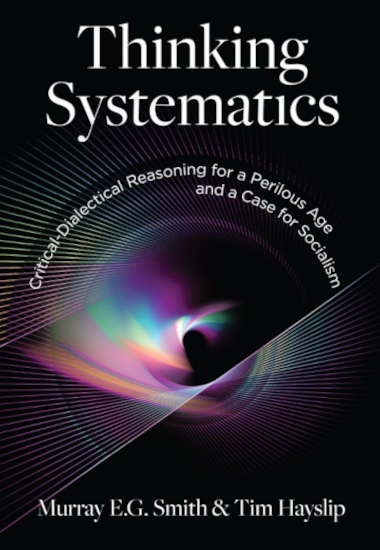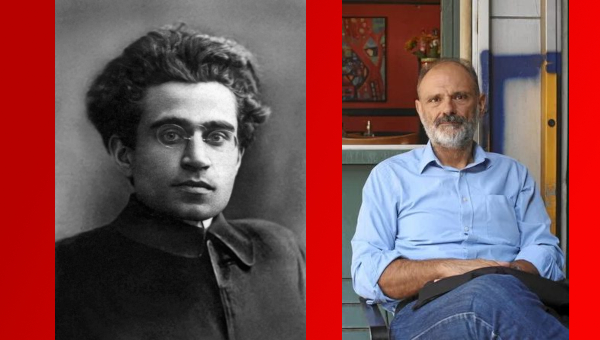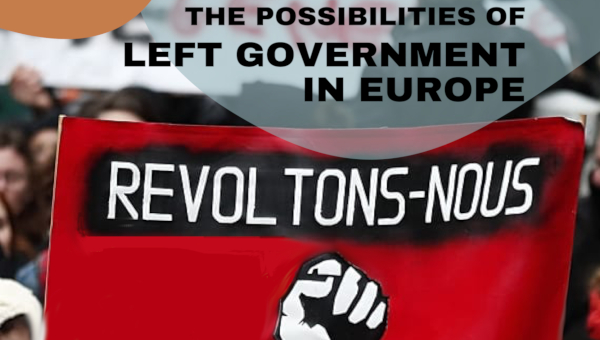Critical-Dialectical Reasoning for a Perilous Age
The following is excerpted and adapted from the authors’ recent book Thinking Systematics: Critical Dialectical Reasoning for a Perilous Age and a Case for Socialism (Fernwood 2025).
Twenty-first century humanity possesses the knowledge and the resources, if these are understood, measured and utilized appropriately, to solve all of our most serious problems. Humans have both the material means and the technical knowledge to create a world in which starvation is eliminated; our physical, mental and emotional well-being is dramatically improved; the freedom of every individual to pursue all-round development is assured; universal peace is taken for granted; and a sustainable equilibrium between human civilization and the natural world is achieved.1 And yet despite this potentiality, our world remains one in which the perpetuation of massive inequalities is the dominant regulating principle of social life; tens of millions die each year from hunger and easily preventable or treatable illnesses; millions more are exposed to the horrors of violent conflict; the most basic rights and freedoms of working people are relentlessly attacked; and the twin perils of ecological/climatic catastrophe and nuclear war loom more and more ominously.2 The gap between what is and what could be (and should be) grows ever wider.

These observations call forth critically important questions that demand yet seldom receive serious consideration from the purveyors of ‘mainstream’ thinking. Why is this glaring contradiction between humanity’s demonstrable potential and the abysmal reality of the contemporary human condition hardly acknowledged much less addressed? Why is it so widely accepted – whether fervently, tacitly, or grudgingly – that the present order of things constitutes the best of all possible worlds and that the only ‘progress’ worth contemplating is that which conforms to the currently dominant forms of social, economic and political organization? Why are those forms so widely seen as non-transcendable ‘facts of life’ rather than for what they are – the principal causes of the acute civilizational crises we confront? To pose these questions a little differently, why are most efforts to safeguard our species’ future and promote human wellbeing confined to natural-scientific/technological fixes on one side and moral/cultural remedies on the other, while the crucial need to critically interrogate the overarching social and economic arrangements that shape our lives is largely neglected?
Examining the Most Serious Problems of Our Time
A key element in answering such questions is the recognition that powerful social forces (corporate/financial elites, state/governmental agencies, academia, educational systems and mass media) operate assiduously to constrain individual thought and collective decision making within limits defined by the social status quo. The result is a widespread discursive stupidity, the major hallmarks of which are an uncritical attitude toward existing, deeply antagonistic social relations and forms, a naïve acceptance of the ways in which public discourse is framed and orchestrated by the major political, educational, cultural and media institutions of the ‘liberal-democratic West’, and a general failure to take ‘The Social’ seriously when examining the most serious problems of our time.
These considerations point to the need for a new mode of thinking, understanding and problem-solving we call ‘Thinking Systematics’ (TSS).
The principal goal of TSS is an ambitious and exceedingly important one – to advance the discovery of objective truths about the current human condition and to revolutionize our individual and collective understandings of a larger world that most of us engage with far too passively. In an era fraught with extraordinary perils, the urgent need for greatly improved thinking and intelligent action on the part of immense numbers of ‘ordinary’ people should be only too obvious, not only as an end in itself but as a means to advancing the well-being and continued progress of humanity.
In pursuit of this Need in Thinking, we invite all those who agree with these aims to take an intellectual journey with us – a journey into evolving modes of cognition and problem solving, into the histories of philosophy and social thought, and into superior ways of investigating and seeking real solutions to the multiple crises of our time. At the individual level, the main reward for those taking this journey will be a deeper and more confident understanding of the twenty-first-century world – a prerequisite not only for preserving one’s sanity in an era characterized by pervasive irrationality but also for living a more fulfilling, meaningful and morally worthy life.
TSS involves a systematic progression from simple abstract concepts to increasingly concrete and complexly determined ones, while also promoting awareness of the dynamics and sharpening ‘real contradictions’ of the current human condition and illuminating the most fruitful means for dramatically improving it. In doing so, it seeks to open up new horizons of discovery, understanding and practical activity.
A distinctive feature of TSS as a specific school of ‘dialectical logic’ (the logic of an ever-changing reality) is precisely the weight it gives to the category of ‘The Social’ in analyzing the human condition and its relationship both to ‘The Natural’ and to what traditional philosophy called ‘The Ideal’ – a category that emerges through the complex interactions of the natural, the social and consciousness (the ontological triad that defines the parameters of the knowable). Consequently, TSS finds its most developed expression in Marxism, understood not merely as a philosophy but as a practical project for transforming the world – a scientific socialism.
At the same time, TSS serves as a potent antidote to the many, currently pervasive intellectual fashions that cast doubt on the very possibility of approximating objective truth. This outlook has become particularly entrenched in the humanities and the social sciences – where equivocation, relativism, and obsessive attention to ‘difference’ and ‘identity’ have been flourishing in recent times at the expense of resolute action to effect much-needed social change and progress. The academic and political wellsprings of confused thinking have become deep and ubiquitous, nurturing a type of skeptical thought that dismisses the pursuit of truth and objective knowledge as not only hopeless but fundamentally misconceived and even oppressive.
Need for Rational Solutions
At a time when our species is in greater need than ever of rational solutions to a host of critical problems facing us all, this subjectivist and often cynical outlook has been intersecting and overlapping with more traditional, ‘faith’-based ways of thinking (of both religious and secular inspiration) to propel a headlong descent into irrationalism. The upshot is that the attenuation or outright denial of the concept of truth has become a license to lie, whether to justify and expand the wealth and extraordinary privileges of powerful elites, or to gain advantage in the competitive struggle over the diminishing rewards available to the vast majority of humanity. And yet, ironically, this ‘retreat from truth’ is often accompanied by a bold assertion of ‘beliefs’ that lack much foundation in either fact or reason. The recourse to brazen lying is thus folded into a faith-based (‘spiritual’) certitude that is logically incompatible with the debilitating skepticism otherwise encouraged. The result, in the words of Professor Raju Das, is “a turn toward what is called post-truth, a situation where facts are considered to be less important than feelings or personal beliefs, so much so that blatant lies and mistaken views (or half-truths) are openly peddled if they serve a specific political-ideological purpose.”3
To be sure, the capitalist social order has always relied on lies, half-truths and ideological misdirection to block or contain popular opposition to its operations. A society animated by invidious competition and ruthless exploitation of working people must suppress the truth about itself in order to maintain some semblance of stability. Moreover, exclusive reliance on the repressive apparatus of the capitalist state (the police, armed forces, the courts, ‘national security’, etc.) to perpetuate the prevailing socio-economic order is understood to be a dangerous, delegitimizing gambit, which is why straightforward repression is always supplemented by sustained efforts to indoctrinate the populace with false narratives about the world and their own conditions of life. All the same, the increasing ferocity with which social and political realities are now being distorted and misrepresented by powerful elites and their media outlets is altogether extraordinary – reflecting, no doubt, the depth of the crisis that their cherished social order is now facing and the consequent rush toward authoritarian governance.
In spite of all this, some significant grounds for optimism are nevertheless emerging. While in recent years the deliberate falsification of ideas and events by those possessing the loudest bullhorns has been remarkably prevalent, a significant pushback is clearly underway and gaining momentum. This is particularly notable in the proliferation of dissenting discourses surrounding the climate emergency, the Covid-19 pandemic, the war in Ukraine, the rise of China, the poverty of liberal democracy, the protracted turbulence of the global economy, and (perhaps most tellingly of all) Zionist Israel’s genocidal assault on the Palestinian people.
The ‘official’ narratives promulgated by Western governments and the corporate mass media on these and many other matters are losing all credibility for masses of people seeking reliable knowledge about a world racked by deepening crises. The increasingly desperate and authoritarian efforts of ruling elites to wrap their self-serving knowledge claims in the mantles of reason, moral rectitude and what is often preposterously called ‘the science’ are faltering badly, arousing much-needed debates over the real meanings of democracy, rationality, scientific inquiry and morality.
Echoing Jesus, who declared “the truth will set you free,” the Marxist revolutionary Leon Trotsky defiantly proclaimed that “the truth is always revolutionary.” Falsehoods, lies, deception, on the other hand, can only serve reaction and all that is most base and hateful in human behaviour. To deny the possibility of attaining truth amounts to denying the possibility of ‘human progress’ – an idea which itself has fallen into disrepute as so many contemporary intellectuals have intensified their opposition to Marxist socialism even while also despairing over the prospects for grand, progressive change under capitalism.
Wellbeing For All
What then is the condition for real human progress, for a future in which all human beings can achieve wellbeing and seek to realize their fullest individual potentials? Not coincidentally, it happens to be the same condition required for the discovery of objective truth, namely the quest to overcome and abolish systemic social antagonisms, above all the exploitation of wage-labour by capital, invidious competition among nation states and peoples, and ecologically unsustainable modes of development. In our view, that quest can only be carried through to the end with an internationalist socialist program grounded on the best, most reliable knowledge arising from serious (natural and social) scientific inquiry. TSS provides important guidance as to how a greater amount of that precious knowledge can be generated and made available to a wider public. In this, it is in complete accord with the young Karl Marx on the need for a unified human science and with the principles that Marx and Engels later popularized under the rubric of scientific socialism. For humanity to survive, to progress and to realize its fullest potential, nothing less than this is required to meet our present ‘need in thinking’.
As growing numbers learn about and apply the methods, analytical strategies and habits of thought associated with TSS, our hope is that this will contribute to the emergence of a ‘new common sense’ – one adequate to meeting the greatest challenges facing humanity in our era. •
Endnotes
- The ‘means’ we refer to here are the capacities and bodies of knowledge acquired by humanity over the past few centuries owing to the remarkable progress of the natural sciences. To be sure, the fruits of that progress have very often been misused and terribly perverted owing to the socially antagonistic contexts in which they developed. There are nevertheless good reasons to think that those capacities, once joined to the fully egalitarian relations of social cooperation promised by socialism, can be transformed into a mighty engine of human emancipation and wellbeing. From this conditionally optimistic perspective, the hopeful projections of authors like M. Tegmark (Life 3.0: Being Human in the Age of Artificial Intelligence, 2018), J. Norberg (Progress: Ten Reasons to Look Forward to the Future, 2017), H. Rosling (Factfulness, 2018), Diamandis and Kotler (Abundance: The Future is Better Than You Think, 2012), and Brynjolfsson and McAfee (Race Against the Machine, 2011 and The Second Machine Age, 2014) can be seen as problematic or utopian, not because they affirm the great potential benefits to humanity of modern science and technology, but because they fail to register how those benefits are systematically distorted and/or effectively blocked by capitalist imperatives. Such ‘bourgeois optimism’ acts as a counterweight to the decidedly pessimistic zeitgeist now prevailing – and thus as a distracting line of intellectual defense of a decaying social order.
- For a wide-ranging analysis of the multiple crises confronting humanity in this century, see Murray Smith, Jonah Butovsky and Josh Watterton, Twilight Capitalism: Karl Marx and the Decay of the Profit System, Fernwood Publishing, 2021.
- See Raju J. Das, Contradictions of Capitalist Society and Culture: Dialectics of Loving and Lying. Leiden: Brill, 2023.





